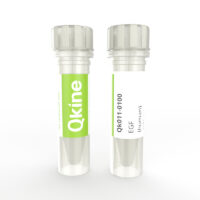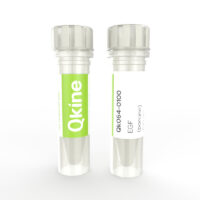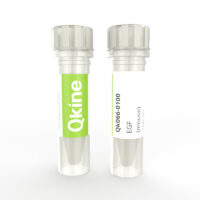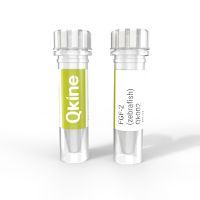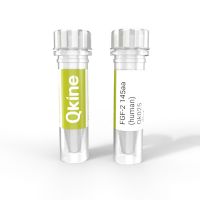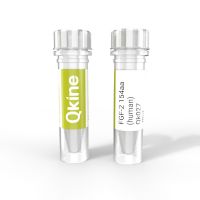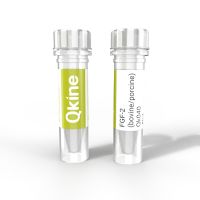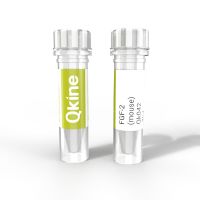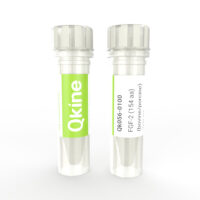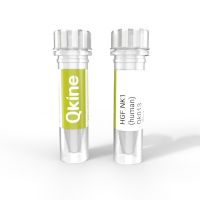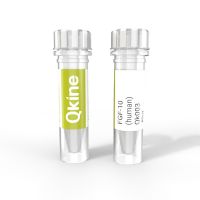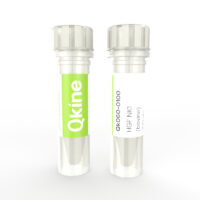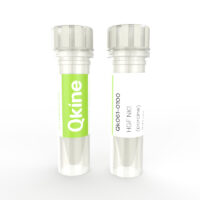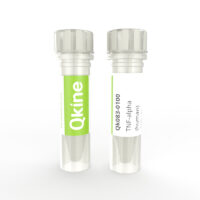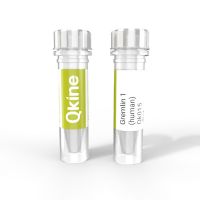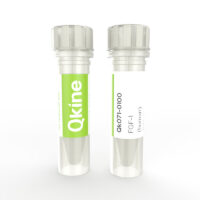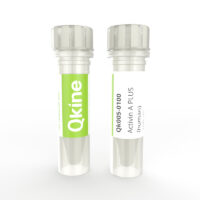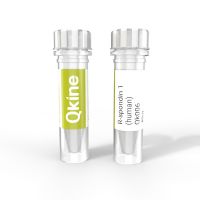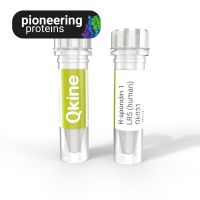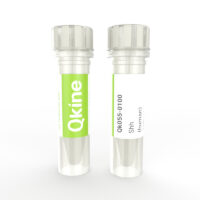- Human EGF protein is a potent EGF-family growth factor used in many human and mouse organoid and stem cell culture systems including intestinal and tumor (cancer) organoid culture.A pure 6.3 kDa biologically active mature human epidermal growth factor. Our recombinant EGF protein is manufactured to the highest purity in E. coli and extensively tested, making it ideal for use in chemically defined iPSC, ESC and organoid culture media.
- Porcine EGF is an essential growth factor belonging to the Epidermal Growth Factor family that stimulates the proliferation and differentiation of cells. It is used for the differentiation of induced pluripotent stem cells (iPSCs) and embryonic stem cells (ESCs) towards epithelial, neural, mesoderm and hematopoietic lineages. Porcine-EGF is becoming rapidly adopted as a species-specific growth factor in the cultivated meat sector. Porcine EGF is also an essential component of many organoid media supporting the culture and differentiation of a wide variety of organoids including intestine and liver organoids.Porcine EGF has a molecular weight of 6.3 kDA. This protein is animal-free, carrier protein-free, His-tag-free and non-glycosylated to ensure a pure recombinant protein with exceptional lot-to-lot consistency.
- Epidermal growth factor (EGF), a member of the EGF family of proteins, plays a significant role in regulating cellular processes such as cell growth, proliferation, differentiation, development, and tissue homeostasis. It is an essential growth factor in many stem cells and organoid culture media.In cell culture, mouse EGF is crucial for stem cell maintenance, proliferation, differentiation, organoid culture growth and survival. It is also widely used for disease modelling, drug screening, tissue engineering, and regenerative medicine. Overall, EGF is a key player in cellular regulation and functions.Mouse EGF is a high purity protein with a molecular weight of 6.1 kDA. This protein is carrier-free and tag-free to ensure its purity with exceptional lot-to-lot consistency. Qkine mouse EGF is suitable for the culture of reproducible and high-quality stem cells and various tissue-specific organoids.
- Zebrafish FGF-2 protein (bFGF/basic FGF) has been used extensively to support the maintenance and proliferation of human and mouse induced pluripotent (iPSC) and embryonic stem cells (ESC); used in the original Ludwig et al feeder-free culture of embryonic stem cells protocols 1-3. High purity 17 kDa FGF2 / bFGF protein, animal-derived component free (ACDF) and carrier-protein free (CF). This version of recombinant zebrafish FGF2 is used by the core facility at the Cambridge Stem Cell Institute, UK and historically by many of the stem cell groups based at University of Cambridge.
- Human FGF2 /bFGF protein (145 aa) is our gold-standard and recommended FGF2 / bFGF protein for induced pluripotent stem cell (iPSC) and embryonic stem cells (ESC) maintenance, and induced pluripotent and mesenchymal stem cells proliferation and differentiation.High purity and bioactivity 17 kDa FGF2 / bFGF protein, animal-derived component free (ACDF) and carrier-protein free (CF) comprising the core structured region (145 amino acids) sufficient for full biological activity.
- Recombinant human FGF2 protein (154 aa) is a highly bioactive, long–form of human fibroblast growth factor 2 protein. FGF-2 protein is used to support the maintenance of human embryonic stem cells and proliferation and differentiation of induced pluripotent and mesenchymal stem cells. This 154 aa form of FGF-2 comprises the core structured region and N-terminal extension.High purity and bioactivity 17 kDa FGF-2 / bFGF protein, animal-free (AOF) and carrier-protein free (CF).
- Recombinant bovine/porcine FGF2 protein 145 aa (bFGF/basic FGF) for the development of species-specific bovine (cow) and porcine (pig) cellular agriculture protocols and veterinary research applications. Used in comparative cell culture media optimization studies alongside Qk056, the 154aa form of porcine/bovine FGF-2.FGF-2 is used extensively in the maintenance and proliferation of induced pluripotent (iPSC) and embryonic stem cells (ESC)1-3 and for enhancement of proliferation in primary cell culture.High purity 16 kDa FGF-2 / bFGF protein, animal origin-free (AOF) and carrier-protein free (CF).
- Recombinant mouse FGF2 protein/ bFGF is an important factor in the maintenance of mouse epiblast-derived stem cells (EpiSC). Mouse naïve pluripotency is maintained by LIF, BMP4, and Wnt signalling pathways. However, the primed state of pluripotency in mouse EpiSCs is more similar to hESC and hiPSC, being maintained by FGF2 and TGFβ/Activin/Nodal pathways.1,2High purity and bioactivity 16 kDa murine bFGF / FGF2 (basic FGF) protein, animal-origin free (AOF) and carrier-protein free (CF).
- Recombinant bovine/porcine FGF2 protein 154 aa (bFGF/basic FGF), this is the long form of FGF-2 used for the development of optimized serum-free culture media for species-specific bovine (cow) and porcine (pig) cultivated meat and veterinary research applications. Used in comparative media optimization studies with Qk040 porcine/bovine FGF-2 145 aa.FGF-2 is used extensively in the maintenance and proliferation of induced pluripotent (iPSC) and embryonic stem cells (ESC)1-3 and for enhancement of proliferation in primary cell culture.High purity 16 kDa FGF-2 / bFGF 154 aa protein, animal origin free (AOF) and carrier-protein free (CF).
- Hepatocyte growth factor (HGF) is a multi-functional cytokine that promotes the growth and proliferation of various cell types including mesenchymal, endothelial, and epithelial cells. It is involved in embryonic development, cell motility, survival, angiogenesis, and tissue regeneration. In cell culture, HGF is used to promote the differentiation of mesenchymal cells towards hepatocytes, osteocytes, and endothelial cells. Recombinant human HFG NK1 protein is a potent naturally occurring isoform of HGF. This protein is animal-free, carrier protein-free, and tag-free to ensure its purity with exceptional lot-to-lot consistency with a molecular weight of 20 kDa. It promotes efficient differentiation of human induced pluripotent stem cells to hepatocyte-like cells at just 10 ng/ml with highly homogeneous expression of the hepatic marker, HNF4α.
- Human/rat/porcine/bovine FGF10 protein promotes lung organoid formation and induces branching morphology. FGF10 protein is used widely in organoid culture, embryonic stem cell (ESC) and induced-pluripotent stem cell (iPSC) differentiation, and for the study of epithelial to mesenchymal transition and tumor metastasis.High purity and bioactivity 17 kDa, bioactive domain of human fibroblast growth factor 10, animal-free (AOF) and carrier-protein free (CF).
- Recombinant bovine HGF protein is a potent, high-purity NK1 isoform of bovine hepatocyte growth factor (HGF). Bovine HGF differs from human HGF at several key amino acid residues that are predicted to affect bioactivity and receptor binding. Use of species-specific HGF growth factor will facilitate media optimization for cellular agriculture (cultivated meat) and veterinary applications. Also available is Qk061 Porcine HGF (NK1). The highly scalable animal-free manufacture and enhanced bioactivity make this suitable for chemically-defined media and reproducible scale-up.20kDa naturally occurring isoform of HGF, animal-free and carrier-protein free.
- Recombinant porcine HGF protein is a potent, high-purity NK1 isoform of porcine hepatocyte growth factor (HGF). Porcine Recombinant Protein HGF differs from human HGF at several key amino acid residues that are predicted to affect bioactivity and receptor binding. Use of species-specific HGF growth factor will facilitate media optimization for cellular agriculture (cultivated meat) and veterinary applications. Also available is Qk060 Bovine HGF (NK1). The highly scalable animal-free manufacture and enhanced bioactivity make this suitable for chemically-defined media and reproducible scale-up.20kDa naturally occurring isoform of HGF, animal-free and carrier-protein free.
- Tumor necrosis factor-alpha (TNF-α) is a cytokine involved in cell signaling, primarily produced by immune cells like macrophages. It plays a central role in inflammation, immunity, and regulating cell survival and death. TNF-α binds to its receptors, TNF receptor 1 and TNF receptor 2, triggering pro-inflammatory responses, apoptosis, and immune cell activation.Human TNF-α has a molecular weight of 17.3 kDa. This protein is carrier-free and protein tag-free to ensure its purity with exceptional lot-to-lot consistency. Qk083 TNF-alpha is suitable for the culture of reproducible and high-quality hematopoietic stem cells and other relevant cells.
- Human/bovine/porcine Gremlin 1 protein is a BMP-inhibitor present in the natural intestinal niche and provides an alternative to Noggin for optimisation of intestinal organoid culture and iPSC differentiation.Qk015 has been optimized by our experts for exceptionally high-purity production in E.coli and bioactivity. 18 kDa high purity dimeric protein, animal-free and carrier protein free
- Fibroblast Growth Factor 1 (FGF-1) regulates the proliferation, migration, and differentiation of mesenchymal cells, with roles in embryonic development, tissue regeneration, and wound healing. FGF-1 also has neurotrophic and lipid metabolism functions and can promote hematopoietic stem cell differentiation. It is implicated in tumor growth and migration.In vitro, FGF-1 can stimulate growth and differentiation of endothelial and epithelial cells and the development of organoids. FGF-1 can also be used for the maintenance of oligodendrocytes and astroglia as well as bone marrow-derived mesenchymal and hematopoietic stem cells.Human FGF-1 has a molecular weight of 15.9 kDa. This protein is carrier-free and tag-free to ensure its purity with exceptional lot-to-lot consistency. Qk071 is suitable for the culture of reproducible mesenchymal, endothelial, haematopoietic, glial, and other relevant cells.
- Human/mouse/rat Activin A PLUS ™ protein is an optimised biologically active truncation of the mature domain of human Activin A protein. The EC50 and activity in stem cell culture of activin A PLUS is equivalent to the full mature domain activin A.High purity 24 kDa dimer comprising truncated mature domain of activin A protein, animal-free (AF) and carrier-protein free (CF). Recombinant Activin A PLUS is designed to be manufactured at scale for cost-effective, large-scale stem cell culture applications.
- R-spondin 1 protein (RSPO1) is the prototypic member of the R-spondin family and is used to potentiate Wnt signaling in many organoid culture systems including intestinal and tumor (cancer) organoid culture. R-spondin 1 is also required for hematopoietic stem cell specification and cancer cell migration and survival.Recombinant human R-spondin 1 protein (RSPO1) protein is the bioactive domain of human R-spondin 1 comprising the two cysteine-rich furin-like domains of R-spondin 1. Those are necessary and sufficient for Wnt signaling potentiation and are the essential domains for activity in stem cell and organoid culture.This protein has a molecular weight of 13 kDa and is animal-free, carrier protein-free, and tag-free to ensure its purity with exceptional lot-to-lot consistency. Qk006 is suitable to replace R-spondin conditioned media for improved reproducibility in chemically defined organoid culture media.
- Recombinant human r-spondin 1 LR5 protein is engineered to act as a high affinity ligand for the LGR5 receptor. In epithelial tissues LGR5 marks the stem cell population. This engineered protein, R-spondin 1 LR5, activates wnt signalling only in the LGR5+ stem cell population. R-spondin1 LR5 has been tested in intestinal organoid culture and supports organoid survival and growth. As LGR5 specifically marks stem cells and is not found on transit amplifying cells, the lower crypt multiplicity seen in organoid cultures with R-spondin 1 LR5 (in comparison to wild-type R-spondin 1, Qk006) supports the notion that this engineered form is acting specifically on stem cells. This specialized form of R-spondin 1 was developed in Marc de la Roche’s lab (University of Cambridge).
- Sonic hedgehog protein (Shh) is a member of the Hedgehog family with an essential role in embryonic development, tissue regeneration, and tumorigenesis. Shh induces the cell fate and patterning of neural progenitors in ventral domains at various levels in the forebrain, midbrain, hindbrain, and spinal cord. It has many applications in the neural stem cell field where it plays a significant role in differentiating human-induced pluripotent stem cells (iPSC) towards motor neurons and interneurons. Also, it induces the patterning of organoids and embryos in culture.Recombinant Shh protein has a molecular weight of 19.8kDa. This protein is animal-free (AOF), carrier protein-free, and tag-free to ensure its purity with exceptional lot-to-lot consistency. Sonic hedgehog protein is suitable for the culture of reproducible and high-quality neurons and organoids.
